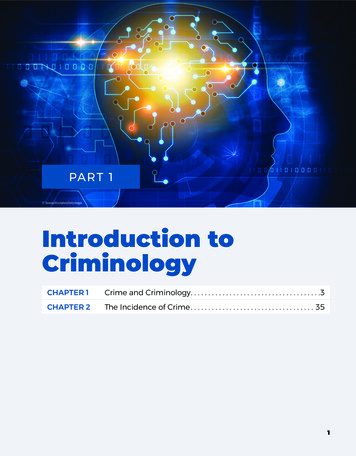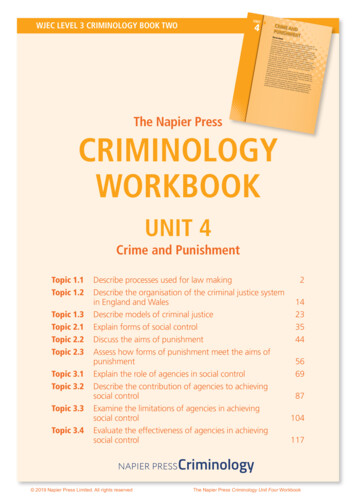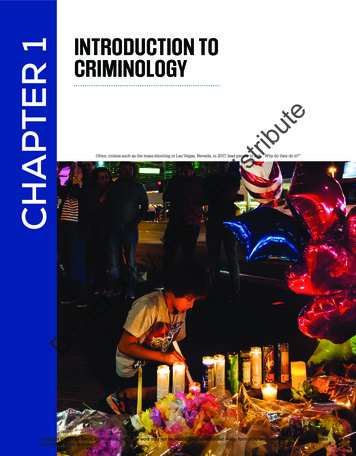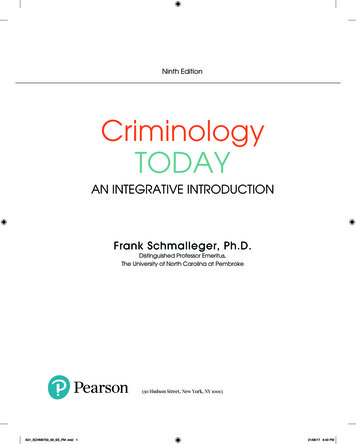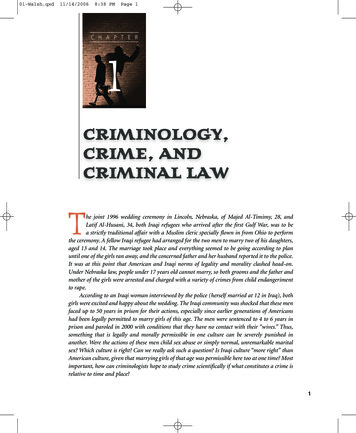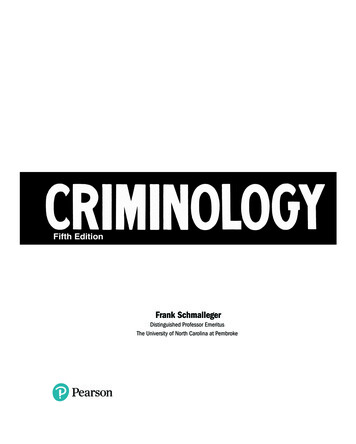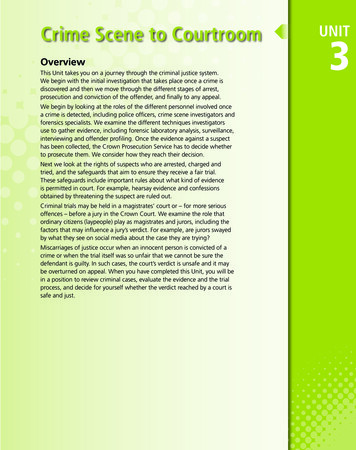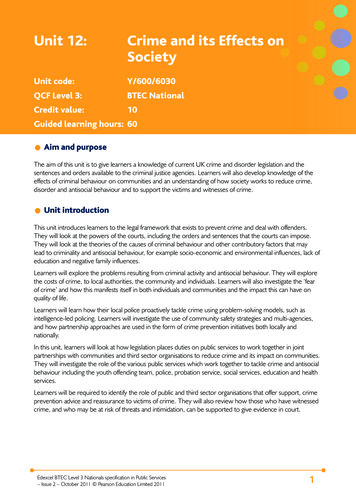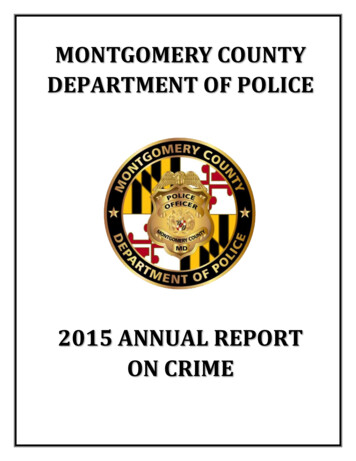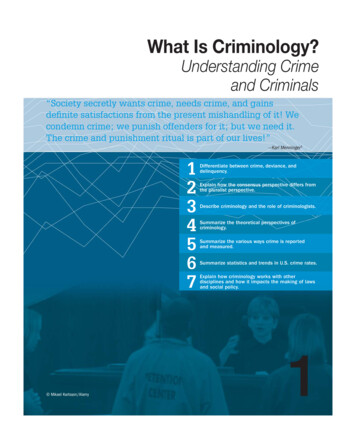
Transcription
What Is Criminology?Understanding Crimeand Criminals“Society secretly wants crime, needs crime, and gainsdefinite satisfactions from the present mishandling of it! Wecondemn crime; we punish offenders for it; but we need it.The crime and punishment ritual is part of our lives!”—Karl Menninger11234567 Mikael Karlsson/Alamy66751 01 ch1 p001-020.indd 1Differentiate between crime, deviance, anddelinquency.Explain how the consensus perspective differs fromthe pluralist perspective.Describe criminology and the role of criminologists.Summarize the theoretical perspectives ofcriminology.Summarize the various ways crime is reportedand measured.Summarize statistics and trends in U.S. crime rates.Explain how criminology works with otherdisciplines and how it impacts the making of lawsand social policy.111/20/12 1:50 PM
INTROA FASCINATION WITH CRIME AND CRIMINALS AF archive/AlamyAccording to social commentators, people are simultaneously attracted to and repulsed by crime—especiallygruesome crimes involving extreme personal violence.The popularity of today’s TV crime shows, Hollywoodproduced crime movies, true-crime books and magazines, and websites devoted exclusively to the coverageof crime supports that observation. The CBS TV megahitCSI: Miami, for example, which ran for ten season untilgoing off the air in 2012, garnered 50 million regularviewers in more than 55 countries. By its eighth season,it had become the most popular television show in theworld.2 But CSI programming extends well beyond theMiami-based series, and the CSI franchise, which nowincludes shows featuring New York City, Las Vegas,and other locales, is available in both real time and ondemand to a global audience of nearly 2 billion viewers inThe cast of the popular TV show, CSI New York.200 countries around the globe.3 In 2012, the CSI serieswas named the most watched TV show in the world for theWe search for explanations for the seemingly unexplainfifth time.4 Other popular TV crime series, both past andable. How, for example, can the behavior of child killerspresent, include Awake (NBC), Criminal Minds (CBS), Bluebe understood, anticipated, and even prevented? WhyBloods (CBS), Without a Trace (CBS), Magic City (HBO),don’t terrorists acknowledge the emotional and personalNumb3rs (CBS), The Unit (CBS), The Unusuals (ABC), Thesuffering they inflict? Why do some robbers kill, utterlySopranos (in reruns on HBO), The Killing (AMC), Whitedisregarding human life?Collar (USA), The District (CBS), Boardwalk Empire (HBO),Toward this end, people wonder about spectacularThe Shield (FX), The Wire (HBO), Cold Case (CBS), NCIScrimes, and “everyday” crimes such as burglary, drug(CBS), Prison Break (Fox), and Law and Order (NBC)—use, assault, vandalism, and computer intrusion needalong with the Law and Order spin-offs Law and Order:explaining. Why do people fight? Does it matter to aCriminal Intent and Lawrobber that he may face prisonand Order: Special Victimstime? How can people sacrificeDISCUSS Why are people fascinated by crimeUnit. American TV viewlove, money, careers, and eveners are hungry for crimeand criminal behavior? How doestheir lives for access to illegalrelated entertainment anddrugs? What motivates terrorhave a fascination with the popularity of TV crime shows reflectists to give up their own livescriminal motivation and the American mindset?to take the lives of others? Whydetective work.do gifted techno-savvy teensSome crimes cry out for explanation. One thing that fascinates people about crime—especially violent crime—isthat it is inexplicable. While it’s true that some crimesare especially difficult to understand, our natural tendency is to seek out some reason for the unreasonable.and preteens hack seemingly secure sites on the Internet? While this text may not answer every question, itexamines the causative factors that are in effect whena crime is committed and encourages an appreciation ofthe challenges of crafting effective crime-control policy. What Is Crime?As the word implies, criminology is clearly concerned withcrime. As we begin our discussion of criminology, let’s considerjust what the term crime means. Like anything else, crime canbe defined several ways. For our purposes, crime is humanconduct that violates the criminal laws of a state, the federalgovernment, or a local jurisdiction that has the power to makeand enforce the laws. We prefer this definition because withouta law defining a particular form of behavior, there is no crime,no matter how deviant or socially repugnant the behavior inquestion may be.52Chapter 166751 01 ch1 p001-020.indd 2Edwin Sutherland, regarded by many as a foundingfigure in American criminology, said that crime’s “essentialcharacteristic is that it is behavior which is prohibited bythe State as an injury to the State and against which the Statemay react by punishment.”6 This is a legalistic perspective,Crime is human conduct that violatesthe criminal law.What Is Criminology? Understanding Crime and Criminals11/20/12 1:50 PM
Some people say that sagging pantsare a fashion statement, while otherssay that wearing such pants is a deviantact. Keeping that example in mind, whatkinds of human behavior might be deviant but not criminal? What things mightbe criminal but not necessarily deviant?example, a Palm Beach County (Florida) judgestruck down a law banning baggy pants, callingthe measure unconstitutional. The judge agreedwith a public defender representing a teenagerarrested for exposing his underwear by wearingpants that sagged. The attorney argued that thelaw was unacceptable because it restricted styles ofdress and empowered “the fashion police.”7However, some types of behavior, although neither deviant nor abnormal, are still against the law.Although speeding on interstate highways in some circumstancesis considered the norm and not deviant, it is still illegal. Complicating matters further, certain behaviors are illegal in somejurisdictions but not in others. Commercialized gambling (slotmachines and games of chance) are against the law in many partsof the United States, although they are legitimized in Nevada, onsome Native American reservations, on cruise ships operatingLEARNING Differentiate betweenoutside U.S. territorial waters,OUTCOMES crime, deviance, andon some Mississippi riverboats,delinquency.and in some state-sponsoredlocales. Even state governmentsGLOSSARYseeking to enhance revenuescrime Human conduct that vioallow gambling through statelates the criminal laws of a state,lotteries—which now operthe federal government, or a localate in 45 states8—althoughjurisdiction that has the power toonline gambling is forbidden make and enforce the laws.in an effort to protect states’criminalize To make an actlottery revenues. Similarly,illegal.prostitution, almost unideviant behavior Human activityformly illegal in the Unitedthat violates social norms.States, is legal in Nevada if itoccurs within licensed brothels statute A formal written enactthat meet state licensing andment of a legislative body.health requirements.delinquency Violations of theFinally, we should add thatcriminal law and other misbehaviordelinquency, a term often usedcommitted by young people.in conjunction with crime anddeviance, refers to violations ofthe criminal law and other misbehavior committed by young people. The laws of many statesproclaim that “youth” ends at a person’s eighteenth birthday,although other states specify the sixteenth or seventeenth birthdayas meeting that requirement. All states, however, specify certainoffenses, such as running away from home, being ungovernable,and drinking alcohol, as illegal for children but not adults.Mark Stout Photography(Think About It and it recognizes that laws are social products. The legalisticapproach to crime assumes that powerful individuals who arein a position to politically influence lawmaking strategies canimpose their preferred definitions of criminal behavior onlawbreakers. By making their own laws, powerful but immoralindividuals might therefore escape the label “criminal” andmay escape punishment for wrongdoings they have committed.Although democratic societies such as that of the United Statesseem immune from legislative process abuse, history demonstrates otherwise. Consequently, crime is socially relative inthe sense that it is created by legislative activity. Without a lawdefining it, there can be no crime. Hence, as social scientistsare fond of saying, “Crime is whatever a society says it is.” Laterin this book, we will focus on the process of criminalization,which is used to criminalize some forms of behavior—or makethem illegal.Crime, Deviance, and DelinquencyIn line with sociological thought, many crimes are seen as deviant or abnormal forms of behavior. The definition of deviantbehavior that we will use in this book is as follows: Deviantbehavior is human activity that violates social norms. Someactivities that are not condemned by statute are nonethelessregarded as “bad behavior.” Sufficiently “bad behavior” calls outfor a societal response, echoing, “That ought to be a crime!” or“There should be a law against that!”Abnormality, deviance, and crime are concepts that do notalways easily mesh. Some forms of deviance are not violations ofthe criminal law, and the reverse is equally true. (See Figure 1–1.)Deviant styles of dress, for example, are not restricted by criminal law unless they violate decency statutes by virtue of lack ofclothing. Laws are generally subject to interpretation, and theymay be modified as social norms evolve. A few years ago, for)1 What Should Be Criminal?IllegalFIGURE 1–1IllegalandDeviantThe Overlap between Deviance and CrimeDeviantBy now, you have probably realized that the question “Whatis crime?” differs from the question “What should be criminal?” Everyone would agree that murder, rape, burglary,and theft are illegal activities, but there is far less agreementabout the legal status of controlled substance abuse, abortion, “abortion pills” (RU-486, or Mifeprex), gambling, and“deviant” forms of consensual adult sexual behavior. Statelegislatures, along with the general public, have recentlyWhat Should Be Criminal?66751 01 ch1 p001-020.indd 3311/20/12 1:50 PM
debated the pros and cons of same-sex marriages and certainforms of biomedical research (specifically human cloningand stem cell research).Certainly, the question “What should be criminal?” can beanswered in many different ways. The social and intellectual processes addressing this question can be found in two contrastingpoints of view: (1) the consensus perspective and (2) the pluralistperspective. The consensus perspective holds that laws shouldbe enacted to criminalize given forms of behavior when membersof society agree that such laws are necessary. The consensus perspective is most applicable to homogeneous societies with sharedvalues, norms, and belief systems. Multicultural and diversesocieties such as the United States find it difficult to achieveshared consensus. Here, even minor matters may spawn complex debates over the issues. For example, a Chicago municipalordinance banned giving wine to a dog and provided that anyonewho did so could be arrested and jailed.9 While the ordinanceseemed reasonable when enacted (after all, dogs sometimes needto be shielded from their owners’ indiscretions), others viewedthe law as silly and unnecessary. The ordinance pitted wineconnoisseurs against collectors, growers, and sellers and animalrights activists against animal protectionists and city councilmembers.10 Those favoring repeal of the ordinance arguedMulticultural and diverse societiessuch as the United States findit difficult to achieve sharedconsensus. Here, even minormatters may spawn complexdebates over the issues.(4Chapter 166751 01 ch1 p001-020.indd 4)2 What DoCriminologists Do?A typical dictionary definition of a criminologist is “one whostudies crime, criminals, and criminal behavior.”11 Occasionally,the term criminologist describes almost anyone working in thecriminal justice field, regardless of formal training. Today, thegrowing tendency is to reserve applying the term criminologistto academics, researchers, and policy analysts with advanceddegrees who study crime, study trends, and analyze societalreactions to crime. In respect to this designation, we describeThink About It Some people believe that “there ought to be a law”about some forms of behavior that are currentlylegal. Others think that people should have morefreedom. What forms of behavior that are currentlycrimes would you like to see legalized? What formsof behavior that are currently legal would you liketo criminalize?Ronald Sumners/ShutterstockNot everyone agrees about what is moralor immoral; nor do they agree about whatshould be legal or illegal—and laws vary fromone place to another. What are some formsof behavior that are illegal in some jurisdictions (or states) but not in others?that it was old-fashioned andreflected badly on an acceptableconsumer product that is a stapleof some ethnic diets. Eventually,the ordinance was repealed, andthe hubbub it had inspired ended.The debate, however, shows theinherent difficulties in achievinga consensus over minor mattersin our complex society.In line with the pluralistview of crime, the pluralist perspective recognizes theimportance of diversity in our society. It states that behaviors are typically criminalized through a political processonly after debate over the appropriate course of action. Thepolitical process creates legislation and may involve additional appellate court actionLEARNING Explain how the conOUTCOMES sensus perspectiveto interpret the laws passedby the legislature. After thediffers from the pluralist perspective.2012 Aurora, Colorado, movietheater shooting and the 2007Virginia Tech University GLOSSARYconsensus perspective A viewshooting, for example, stateand federal legislatures reex- point that holds that laws shouldamined gun laws to deter- be enacted to criminalize givenforms of behavior when membersmine whether new laws wouldof society agree that such lawskeep guns out of the hands of are necessary.potential mass killers. Withpluralist perspective A viewour society’s diversity of perspectives, agreement was not point that recognizes the imporeasy to reach—and gun con- tance of diversity in our societyand says that behaviors aretrol proponents won out, attypically criminalized throughleast temporarily.a political process.18percentgrey/Shutterstock(Think About It )What Is Criminology? Understanding Crime and Criminals11/20/12 1:50 PM
TABLE 1–1WHAT DO CRIMINOLOGISTS DO?The term criminologist refers to credentialed individuals holding advanced degrees in the field and studying crime, criminal behavior, and crimetrends. The word criminalist describes people who collect and examine the physical evidence associated with specific crimes. Others working in thecriminal justice system are called criminal justice professionals. This table and Figures 1–2 and 1–3 illustrate these differences.The activities of criminologists include but are not limited to the following:Data gathering and analysisPublic serviceCrime-pattern analysis and trend identificationDeveloping crime prevention programsTheory constructionScholarly presentations and publicationsHypothesis testingEducation and trainingSocial policy creationThreat assessment and risk analysisPublic advocacyService as an expert witness at trial or in other court proceedingshighly skilled investigators, crime laboratory technicians, fingerprint experts, crime-scene photographers, ballistics experts,and others who work to solve particular crimes as criminalists.A criminalist is “a specialist in the collection and examinationof the physical evidence of crime.”12 By contrast, police officers,corrections professionals, probation and parole officers, judges,district attorneys, criminal defense attorneys, and others whodo the day-to-day work of the criminal justice system are bestreferred to as criminal justice professionals.Academic criminologists and research criminologistsgenerally hold doctoral degrees (Ph.D.) in criminology or criminal justice from accredited universities. Some criminologistshold degrees in related fields such as sociology and politicalscience, specializing in the study and control of crime anddeviance. Most Ph.D. criminologists teach criminology orcriminology-related subjects in institutions of higher learning,including universities and two- and four-year colleges. Nearlyall criminology professors are involved in research or writingprojects, thereby advancing criminological knowledge andexpertise. Some Ph.D. criminologists are strictly researchersand work for federal agencies such as the National Instituteof Justice (NIJ), the Bureau of Justice Statistics (BJS), and theNational Criminal Justice Reference Service (NCJRS) or forprivate (albeit often government-funded) organizations such asRAND and SEARCH.With a master’s or bachelor’s degree in the field of criminology, criminologists often find easy entrance into police investigative or support work, probation and parole agencies, courtsupport activities, and correctional (prison) venues. Criminologists also work for government agencies developing effectivesocial policies intended to deter or combat crime.In addition, private security offers other career optionsto individuals interested in criminology and criminal justice.Twice as many law enforcement personnel are employed byprivate security agencies than public law enforcement agencies,and the gap is widening. Many upper- and mid-level privatemanagers at private security firms hold criminology or criminal justice degrees.Training in criminology offers many career alternatives.(See Table 1–1.) Some people trained in criminology or criminal justice decide to attend law school, while others becometeachers or even private investigators. Many criminologistsprovide civic organizations (such as victims’ assistance and justice advocacy groups) with their expertise, work for politicians Law enforcement officer Judge Probation or parole officer Defense attorney Forensics examiner Correctional officer Crime-scene photographer Prosecutor Crime-laboratory technician Crime-scene investigator Prison program director Jailer Computer crime investigator Polygraph operator Ballistics expert Fingerprint examinerFIGURE 1–2Jobs in the Field of Criminalistics Private security officer Juvenile justice worker Victims’ advocateFIGURE 1–3Jobs in the Field of Criminal JusticeWhat Do Criminologists Do?66751 01 ch1 p001-020.indd 5511/20/12 1:50 PM
This chapter identifies significantdifferences between a criminologist and those who work in the fieldof criminal justice. What are thosedifferences? Given a choice, whichtype of work would you like to do?and legislative bodies, or appear on talk shows debating socialpolicies designed to “fight” crime. Some criminologists evenwrite books like this one.What Is Criminology?This text describes various criminological theories andexplains the most popular ones in detail. Let’s start by definingthe term criminology.Theorists believe that theword criminology was coinedLEARNING Describe criminologyin 188913 by a Frenchman, PaulOUTCOMES and the role ofTopinard, to describe the studycriminologists.of criminal body types withinthe field of anthropology.14GLOSSARYWith varying interpretacriminologist A person trainedtions, numerous definitions ofin the field of criminology whocriminology are found in litstudies crime, criminals, anderature today. One straightforcriminal behavior.ward definition comes from alinguistic analysis of the wordcriminalist “A specialist in thecriminology, which literallycollection and examination ofthe physical evidence of crime.”means “the study of criminalaccusations”—or simply, “thecriminology The scientific studystudy of crime.”of crime and criminal behavior,Edwin H. Sutherland,including their manifestations,referred to as the “deancauses, legal aspects, andof American criminology,”control.offered definitions of the field,criminal justice The scientificemphasizing its importance asstudy of crime, criminal law, thea discipline of study.15 Suthercriminal justice system, police,land’s textbook, first publishedcourts, and correctional systems.in 1924, set the stage for muchof American criminology. By1974, in the final printing of that text, Sutherland’s original definition of criminology was restated as follows: “Criminology includes the processes of making laws, of breaking laws, and ofreacting toward the breaking of laws.”16For our purposes, we will use a definition that bringstogether the works of previous writers and recognizes theincreasingly professional status of the criminological enterprise.Throughout this book, then, we view criminology as aninterdisciplinary profession built on the scientific study of crimeand criminal behavior, including their manifestations, causes, legalaspects, and control. As this definition indicates, criminologyincludes consideration of possible solutions to the problemof crime. This text (in later chapters) describes treatment36Chapter 166751 01 ch1 p001-020.indd 6)strategies and social policy initiativesthat grew out of existing theoreticalexplanations for crime.Our definition of criminologyshows that it is more than a field ofstudy or a collection of theories; it isalso a profession.17 More than a decadeago, experts recognized the importance of controlling crime throughthe prevention, rehabilitation, anddeterrence of repeat offences. In thisway, our society ensures that the criminal justice system reflectsthe high aspiration we have as a society of “justice for all,” whichis characterized by the principal goals that motivate the work ofthe field of criminology.18Notably, criminology also contributes to the discipline ofcriminal justice, which emphasizes application of criminallaw and the study of the components of the justice system,especially the police, courts, and correctional systems. As oneauthor stated, “Criminology gives prominence to questionsabout the causes of criminality, while the control of lawbreakingis at the heart of criminal justice.”19 wellphoto/Fotolia(Think About It Theoretical CriminologyTheoretical criminology, considered a subfield of general criminology, is the type of criminology that is usually studied incolleges and universities. Theoretical criminology, instead ofsimply describing crime and its occurrence, offers explanationsfor criminal behavior. As Edwin Sutherland said, “The problemin criminology is to explain the criminality of behavior .However, an explanation of criminal behavior should be a specific part of [a] general theory of behavior and its task should beto differentiate criminal from noncriminal behavior.”20Criminologists have developed many theories to explainand understand crime. A theory, ideally, is made of clearly statedpropositions suggesting relationships, often causal, betweenevents and occurrences being studied. An old Roman theory,for example, maintained that insanity was caused by lunarinfluences and followed its cycles—hence the term lunacy.Theories provide us with explanatory power, aiding ourunderstanding of the phenomenon under study. A generaltheory of crime attempts to explain most forms of criminalconduct through a single, overarching approach. Unfortunately, as prominent scholars observe, “Theories in criminology tend to be unclear and lacking in justifiable generality.”21When we consider all criminal behaviors—from murder todrug use to white-collar and computer crime—who wouldimagine that one theory could explain them all? Still, manypast theoretical approaches to crime causation were unicausal,posing a single identifiable source for all serious deviant andcriminal behavior.An integrated theory does not necessarily explain allcriminality, but is distinguished because it merges conceptsdrawn from different sources. As noted criminologist GreggBarak states, “An integrative criminology seeks to bringtogether the diverse bodies of knowledge that represent theWhat Is Criminology? Understanding Crime and Criminals11/20/12 1:50 PM
full array of disciplines that study crime.”22This is why integrated theories providepotentially wider explanatory power thanA unicausal theory posits a single identifinarrower formulations.able source for all serious deviant andBoth theoretical integration and the abilitycriminal behavior. Can you offer (or create)to apply criminological theories to a wide varietyan example of a unicausal theory ofof law-violating behavior are appealing concepts.crime? Can you think of one explanationEven far more limited attempts at criminologicalthat encompasses the behavior of diversetheorizing, however, often face daunting chaloffenders such as those who deal in drugslenges. As criminologist Don C. Gibbons notes,or participate in prostitution? Why is this“Criminologists have not managed to articulateexercise especially challenging?a large collection of relatively formalized argu23ments in a general or integrated form.” Manysocial scientists insist that to be considered theories, explanations must consist of sets of clearlyconstruction doesn’t lessen thestated, logically interrelated, and measurable propositions. The factimpact of victimization expethat only a few of the theories described in this book rise aboverienced by people affected bythe level of organized conjecture—and those offer only limitedcrime. Nor does this statementapplicability to other settings and have rarely been integrated—trivialize the significance ofis one of the greatest challenges facing criminology today.crime-prevention efforts or theSo although we will use the word theory to describe the many explaactivities of members of thenations for crime covered in this book, the word will only looselycriminal justice system. Crimeapply to many of the perspectives on crime causation discussed.has a measurable cost to individual victims and to societyThe Social Context of Crimeas a whole. Although a giveninstance of criminal behaviorCrime does not occur in a vacuum. For this reason, we say thatmay have many causes, it maycriminal activity is diversely created and variously interpreted—also carry with it many difmeaning that different people will have various interpretationsferent meanings. There mayregarding the who, what, when, where, and why of crime. Webe one meaning for offendrecognize in this book that crime is not an isolated individualers, another (generally quiteactivity, but a social event.different) for victims, andEvery crime has a unique set of causes, consequences, andstill another for agents of theparticipants. Crime affects some people more than others,criminal justice system. In vieweven impacting those who are not direct participants in theof this fact, all social interact itself—offenders, victims, police officers, witnesses, and soest groups (victims’ advocates,forth. In general, crime provokes reactions from the individualsprisoner “rights” advocates,it victimizes. These reactions flow from concerned groups ofand gun control organizations)citizens to the criminal justice system and sometimes to sociinterpret law-breaking behavety as a whole. This can manifest itself in the creation of newior from their unique pointsocial policy, or laws. Reactions to crime, from the everyday toof view. Then each arrives atthe precedent-setting, may color the course of punishment fordifferent conclusions regardingfuture criminal events.24resolving the so-called probLike other social events, crime is fundamentally alems inherent in crime.social construction.25 However, agreeing that crime is a social()Think About It This textbook says that “criminal activityis diversely created and variously interpreted.” What does that mean? Similarly,what does it mean to say that “crime isfundamentally a social construction”?How does the concept of social relativitycome into play in the field of criminology?Monkey Business ImagesLEARNING Summarize the theoOUTCOMES retical perspectives4of criminology.GLOSSARYtheoretical criminology The typeof criminology that is usually studied in colleges and universities,describes crime and its occurrence, and offers explanations forcriminal behavior.general theory A theory thatattempts to explain most forms ofcriminal conduct through a single,overarching approach.unicausal Of or having onecause. Theories posing onesource for all that they attempt toexplain.integrated theory An explanatoryperspective that merges conceptsdrawn from different sources.social relativity The notion thatsocial events are interpreteddifferently according to the cultural experiences and personalinterests of the initiator, observer,or recipient of that behavior. Ilya Andriyanov/Shutterstock(Think About It )Theoretical Criminology66751 01 ch1 p001-020.indd 7711/20/12 1:50 PM
Contributions utionsInterpretationsSOCIETYTHE CRIMINAL EVENTInterpretationsContributionsJUSTICE SYSTEMVICTIM Outputs InputsInterpretations ContributionsInterpreting the Criminal Event8Chapter 166751 01 ch1 p001-020.indd 8FIGURE litical ScienceMedicineSociologyAcademically, criminology is presently considered primarilya social scientific discipline. Nonetheless, contemporarycriminologists recognize that their field is interdisciplinary—drawing on other disciplines to provide an integrated approachto crime in contemporary society and advancing solutions tothe social problems that crime creates. Here, anthropology (cultural anthropology, or ethnology), biology, sociology, politicalscience, psychology, psychiatry, economics, ethology (the studyof character), medicine, law, philosophy, ethics, and numerousother fields all have something to offer the student of criminology. Other disciplines providing the tools to measure resultsare found in statistics, computer science, an
Explain how criminology works with other disciplines and how it impacts the making of laws 7 and social policy. Summarize statistics and trends in U.S. crime rates. 6 Summarize the various ways crime is reported 5 and measured. Summarize the theoretical perspectives of 4 criminology. Describe criminology and the role of criminologists. 3File Size: 1MBPage Count: 20
